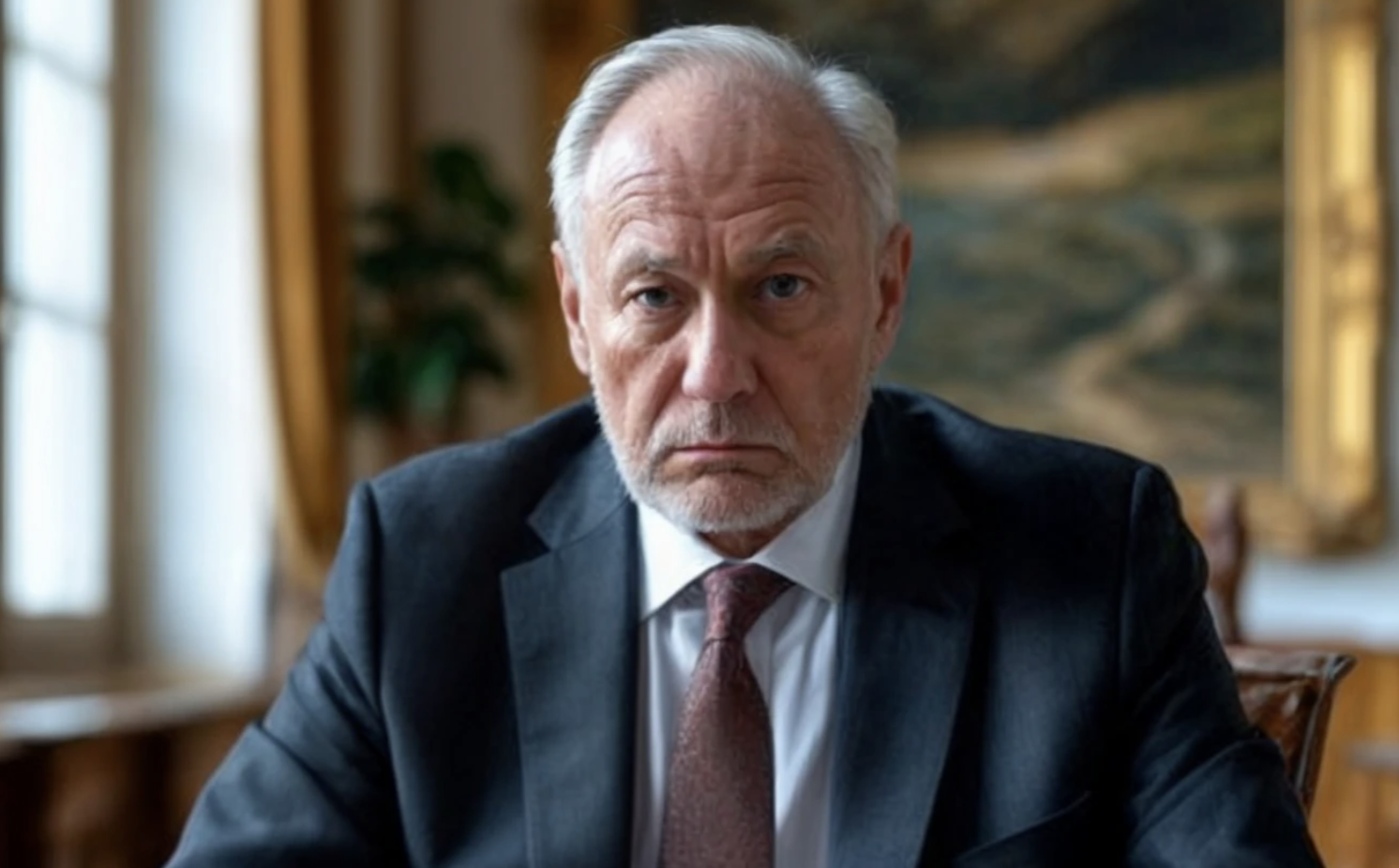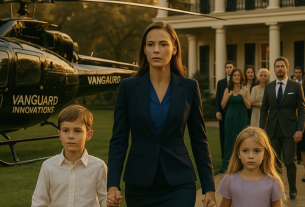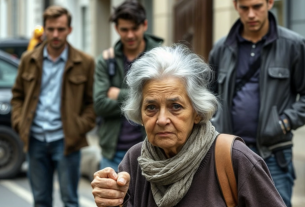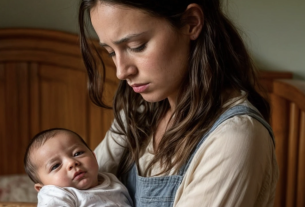Fedor sat in the cool office of a private clinic, his fingers so tightly interlaced that they had turned white from the strain. Every word from the doctor, spoken with that particular caution that only comes when delivering dreadful diagnoses, seemed to drive another nail into the coffin of his fate.
An invisible noose tightened around his throat, and he remained silent, unable to muster even a sound. Only when the doctor finally fell silent was Fedor able to take a deep, halting breath.
“I have money. A lot of money,” his usually confident voice betrayed a tremor, revealing despair. “Isn’t there some way to find a solution? Maybe abroad? In the world’s most advanced medical centers?”
The gray-haired doctor slowly shook his head, and that simple gesture held more answers than Fedor wanted to hear.
“In your case, even the funds won’t help. All that remains is the hope for a miracle, but you know miracles don’t exist,” the doctor’s voice sounded gentle, almost apologetic.
“I would highly recommend spending the remaining time with your loved ones in a comfortable environment. Environment really matters. And I will prescribe you some medications, which must be taken exactly as directed.”
Fedor stepped outside and mechanically walked to his black Maybach, but he froze, unable to bring himself to open the door. Life continued around him: people hurried somewhere, children laughed, birds chirped. The world remained the same, yet for him everything had changed forever.
How strange – just a couple of months ago he hadn’t even thought about death. He was making plans, expanding his business, dreaming of buying a new villa by the coast. And then suddenly that absurd fainting spell right in the middle of an important meeting.
The impeccably composed and elegant man was carried out of the conference room before the astonished eyes of his partners. The doctor insisted on a complete examination, and here was the result.
“Why did I even agree to this?” Fedor bitterly mused as he finally started his car. “I could have continued living as before, knowing nothing.”
He sat in his car for a long time, staring at one spot. He reflected on how he had been rushing through his life, trying to prove something—to himself, to others, to the whole world. Rushing to earn as much as possible, and now…
Now he looked back and realized – there was no one by his side. He had wealth, but you can’t hug money, talk to it, or expect it to care. Heartless pieces of paper that now seemed utterly useless.
At sixty-five, he was left alone. The luxurious mansion, more reminiscent of a medieval castle, had become a mockery of fate. How many efforts had gone into its creation!
Fedor had organized an actual contest among architects, personally overseeing every detail. The house was literally stuffed with modern technologies – automation systems, climate control, multi-layered security… And now, who would inherit it all?
He had spent a full seven days preparing his affairs. He had drawn up his will, determined the future of his company – the buyer had long been found. He had chosen a respectable retirement home for affluent, lonely people. All that remained was to decide what to do with the mansion.
That day, Fedor decided to take a walk in the park. The weather delighted with its beauty, and there weren’t many people around. He was even pleased by that – he did not want to spoil others’ moods with his gloomy demeanor. Suddenly, his temples began to throb, and he had to sit down on the nearest bench.
“Excuse me, would you happen to have some small change?”
He turned toward the hesitant voice. Standing nearby was a woman accompanied by a small, skinny girl of about seven. The little girl was remarkably thin, but her eyes shone with a sort of adult determination – as if she were ready to take on the whole world.
“Why are you looking at me as if I’ve already refused you?” Fedor asked, surprised by his own words.
The woman flinched, as if awakening from a long sleep.
“Because most people do just that,” she replied softly, almost defensively. “I just don’t know how to ask, so I perceive everyone as hostile immediately.”
“Then why do you ask at all? Maybe try to find a job?”
She hopelessly waved her hand, clutching the child to her side.
“It seems so easy from the outside. But in reality, everything is tangled beyond repair. I should have… you know what she would have done if it weren’t for Anka.”
Fedor didn’t know the details, but one thing was clear – that little girl needed food.
“Come with me. I’ll feed you, and then, if you like, you can tell me your story.”
The woman looked at him with suspicion:
“And you’re sure you’re not a psycho? I don’t care anymore, but Anka…”
Fedor himself was surprised when he burst out laughing – his first laugh in days.
“No one’s ever called me a psycho. Besides, are there any at my age?”
Within half an hour they were sitting at a table in his enormous house. The maid had recently left but had left the refrigerator full and promised to check in every three days. The girl ate neatly, unhurriedly, but with focus. The woman, who introduced herself as Natasha, initially barely touched her food, clearly embarrassed.
Her story turned out to be both typical and terrible. An orphan with living alcoholic parents, a disastrous marriage to a gambler, debts, threats, an escape… Now she and Anya were barely scraping by without a roof over their heads and without any hope for the future.
Fedor let them spend the night. He himself spent the whole night awake, lost in thought. And in the morning he made a decision:
“Natasha, I’m leaving this house to you and Anya. I need nothing more; I’ll be living in the retirement home.”
To soothe the shaken woman and to prove that he wasn’t losing his mind, Fedor shared his own story. Natasha wept:
“How can this be? You’re a good person! Surely there’s nothing that can be done?”
“The doctors say only a miracle can help, but they also said miracles don’t exist.”
“They do exist,” she firmly retorted. “Today, you’ve already proven it. I believe you’ll make it.”
At the retirement home, everything was impeccable – cleanliness, coziness, attentive staff. For that price, nothing else was expected. In the evening, the director invited him to his office and carefully examined the documents.
“Why aren’t you seeking treatment?” he asked.
“And why should I? The doctor said it was pointless.”
“A doctor?” the director raised an eyebrow. “What kind of specialist gives up so easily? Would you like me to refer your case to a renowned expert I know?”
The next day Fedor went back home for his documents. He also wanted to check on how Natasha and Anya were doing – it was time to start making arrangements for the house. However, the door was unlocked, which alarmed him.
Upon entering, Fedor immediately noticed the tearful little girl.
“Anya, what happened?”
“Mom… she’s sick and isn’t responding to me…”
He hurried to the room. Natasha was lying on the couch, as pale as a sheet, sweating profusely. She was tossing about in the heat, murmuring incomprehensible words. His heart clenched with a familiar fear – a feeling he knew all too well from the times when a loved one was ill and he was utterly helpless.
Wait. Loved ones? When had he started considering them as his own? But now was not the time for such reflections. He immediately called an ambulance and insisted on hospitalizing her in one of the best private clinics, providing his details for the paperwork.
Anya quietly sniffled in the corner. That sound echoed painfully in his heart. Fedor sat down before the child:
“Don’t cry, everything will be alright. Your mom will get better.”
“But you won’t leave, will you?” she asked, her eyes red as she looked up at him.
“Of course not. How could I ever leave you? Tomorrow, we’ll definitely go to see your mom; she’ll feel better.”
That evening, for the first time in many years, he cooked for himself. Later, he and Anya had dinner together. Before bedtime, they called the hospital – the nurse reported that Natasha was significantly better, though her body would need time to recover.
Fedor contacted the retirement home, notifying them that he would temporarily forgo their services. In that moment, he felt an extraordinary surge of energy. Someone truly needed him! And not just his money. Now he understood – that little girl and her mother had become the meaning of his life.
Two weeks flew by like a blink. Together with Anyuta, he regularly visited Natasha; they strolled, went shopping, even visited the theater. The little girl joyfully shared her impressions of new dresses and toys with her mother. Fedor watched them and felt a strange emotion… Whether it was paternal or grandparental love, he wasn’t sure. One thing he knew for certain: he could no longer imagine life without the little one.
When Natasha was discharged, Fedor returned not to the retirement home but back to that very clinic where his fate had been pronounced.
“I would like to have a repeat examination. A very thorough one. To determine the right treatment. The fact is, now I have a reason to live. I want to live many more years.”
Two weeks later he returned for the results. The doctor looked embarrassed:
“Did something happen?”
“Yes… something happened for the first time in my entire practice. We apologize. It appears the tests were mixed up. Your case was mistaken. You do not have a serious disease. You only have issues with your blood pressure, which are entirely manageable. By the way, your fainting spell that started it all was due to a sharp spike in your blood pressure.”
The doctor continued talking about compensations and the clinic’s reputation, but Fedor no longer listened. He stood up and, following a sudden impulse, embraced the specialist tightly:
“I don’t need anything. You can’t even imagine how precious every minute of life is to me right now. And you say miracles don’t exist!”
On his way home he stopped by a pastry shop.
“I need the most wonderful cake. The tastiest and the most beautiful.”
The saleswoman smiled as she handed him the purchase:
“Is it your birthday today?”
Fedor paused for a second, then replied:
“Exactly. Today is my birthday.”
Natasha and Anya sat on the couch, watching him anxiously. Fedor froze. He saw that they were worried about his health. It was amazing – it turned out that these people cared about him.
“Grandpa, they’ll cure you, right? They’ll cure you, won’t they?” – Anya called him that for the first time, and Fedor, tossing the cake onto the table, spun the child into the air.
“I’ve already been cured! And we’ll live long, long – at least until you get married.”
Anya looked at him seriously:
“I don’t want to get married. I want to be with you.”
Natasha also got up:
“What mysteries are you talking about? Tell us.”
Fedor gently set the girl down on the floor and smiled:
“The doctors made a mistake. I am completely healthy.”
Natasha burst into tears, hugging him:
“I knew it. I knew everything would be alright.”
A couple of days later, Natasha began packing her things. Fedor looked at her in confusion:
“Where are you going?”
“Well, if you’re healthy…” she hesitated, embarrassed. “We can’t just stay here. It isn’t right.”
Fedor sighed deeply:
“You’re not going anywhere. Don’t even think about it. Anya will be starting school soon. You need to study, work… You know, Natasha, I never had children, and now… it seems I’ve found a family. May I call you my daughter?”
Natasha stared at him silently for a long time, then burst into tears again:
“Thank you. For everything. You have done more for us than any own father ever could.”
Fedor kept his promise – twice. First, he accompanied Natasha to the altar, and then he did the same with his charming “granddaughter” Anya. Those who did not know their story were convinced that Natasha was his biological daughter and that Anya was his granddaughter.
To be honest, even Fedor now believed that version. The past was left behind.



